论安德烈·勒菲弗尔改写理论
浅析安德鲁勒菲弗尔的翻译理论
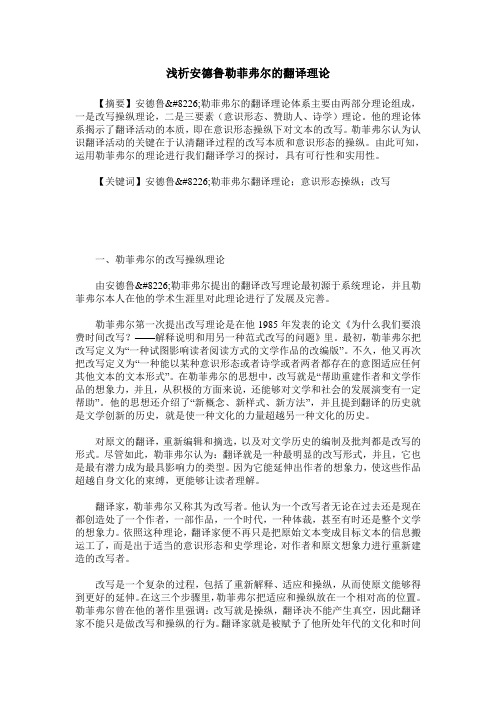
浅析安德鲁勒菲弗尔的翻译理论【摘要】安德鲁•勒菲弗尔的翻译理论体系主要由两部分理论组成,一是改写操纵理论,二是三要素(意识形态、赞助人、诗学)理论。
他的理论体系揭示了翻译活动的本质,即在意识形态操纵下对文本的改写。
勒菲弗尔认为认识翻译活动的关键在于认清翻译过程的改写本质和意识形态的操纵。
由此可知,运用勒菲弗尔的理论进行我们翻译学习的探讨,具有可行性和实用性。
【关键词】安德鲁•勒菲弗尔翻译理论;意识形态操纵;改写一、勒菲弗尔的改写操纵理论由安德鲁•勒菲弗尔提出的翻译改写理论最初源于系统理论,并且勒菲弗尔本人在他的学术生涯里对此理论进行了发展及完善。
勒菲弗尔第一次提出改写理论是在他1985年发表的论文《为什么我们要浪费时间改写?——解释说明和用另一种范式改写的问题》里。
最初,勒菲弗尔把改写定义为“一种试图影响读者阅读方式的文学作品的改编版”。
不久,他又再次把改写定义为“一种能以某种意识形态或者诗学或者两者都存在的意图适应任何其他文本的文本形式”。
在勒菲弗尔的思想中,改写就是“帮助重建作者和文学作品的想象力,并且,从积极的方面来说,还能够对文学和社会的发展演变有一定帮助”。
他的思想还介绍了“新概念、新样式、新方法”,并且提到翻译的历史就是文学创新的历史,就是使一种文化的力量超越另一种文化的历史。
对原文的翻译,重新编辑和摘选,以及对文学历史的编制及批判都是改写的形式。
尽管如此,勒菲弗尔认为:翻译就是一种最明显的改写形式,并且,它也是最有潜力成为最具影响力的类型。
因为它能延伸出作者的想象力,使这些作品超越自身文化的束缚,更能够让读者理解。
翻译家,勒菲弗尔又称其为改写者。
他认为一个改写者无论在过去还是现在都创造处了一个作者,一部作品,一个时代,一种体裁,甚至有时还是整个文学的想象力。
依照这种理论,翻译家便不再只是把原始文本变成目标文本的信息搬运工了,而是出于适当的意识形态和史学理论,对作者和原文想象力进行重新建造的改写者。
从翻译改写理论分析侦探小说的翻译演进——以《巴斯克维尔的猎犬》为例
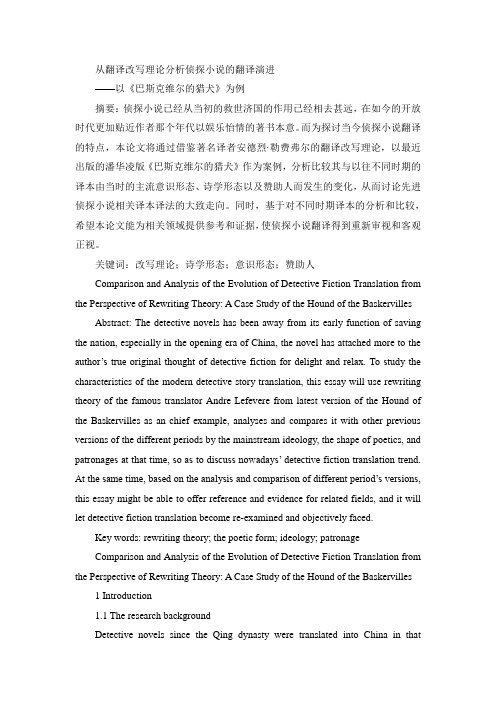
从翻译改写理论分析侦探小说的翻译演进——以《巴斯克维尔的猎犬》为例摘要:侦探小说已经从当初的救世济国的作用已经相去甚远,在如今的开放时代更加贴近作者那个年代以娱乐怡情的著书本意。
而为探讨当今侦探小说翻译的特点,本论文将通过借鉴著名译者安德烈·勒费弗尔的翻译改写理论,以最近出版的潘华凌版《巴斯克维尔的猎犬》作为案例,分析比较其与以往不同时期的译本由当时的主流意识形态、诗学形态以及赞助人而发生的变化,从而讨论先进侦探小说相关译本译法的大致走向。
同时,基于对不同时期译本的分析和比较,希望本论文能为相关领域提供参考和证据,使侦探小说翻译得到重新审视和客观正视。
关键词:改写理论;诗学形态;意识形态;赞助人Comparison and Analysis of the Evolution of Detective Fiction Translation from the Perspective of Rewriting Theory: A Case Study of the Hound of the Baskervilles Abstract: The detective novels has been away from its early function of saving the nation, especially in the opening era of China, the novel has attached more to the author’s true original thought of detective fiction for delight and relax. To study the characteristics of the modern detective story translation, this essay will use rewriting theory of the famous translator Andre Lefevere from latest version of the Hound of the Baskervilles as an chief example, analyses and compares it with other previous versions of the different periods by the mainstream ideology, the shape of poetics, and patronages at that time, so as to discuss nowadays’ detective fiction translation trend. At the same time, based on the analysis and comparison of different period’s versions, this essay might be able to offer reference and evidence for related fields, and it will let detective fiction translation become re-examined and objectively faced.Key words: rewriting theory; the poetic form; ideology; patronageComparison and Analysis of the Evolution of Detective Fiction Translation from the Perspective of Rewriting Theory: A Case Study of the Hound of the Baskervilles1 Introduction1.1 The research backgroundDetective novels since the Qing dynasty were translated into China in thatspecial historical period of national survival. The Complete works of Sherlock Holmes in different periods has different translation versions. And the differences are resulted from various specific factors and reasons for this. Since 1980s, the stress of the translation research has been shifted from internal study to culture context, which contains society, culture, and ideology, etc. Andre Lefevere's rewriting theory is famous among various theories in this revolution. It is aimed to describe translation phenomena and use three factors theory, namely rewriting theory to analyze these phenomena and tries to expose potential regularity of translation.Nowadays, the detective novels has been away from its original function of saving the nation, especially in the open era of China, the novel has attached more to the author’s true thought of detective fiction for delight and relax.To study the characteristics of the modern detective story translation, this essay will use the famous translator Andre Lefevere’s rewriting theory from version of the Hound of the Baskervilles as an chief example, analyses and compares it with other previous versions of the different periods by the mainstream ideology, the shape of poetics, and patronages at that time, so as to discuss nowadays’ detective fiction translation trend. At the same time, based on the analysis and comparison of different period’s version, this essay might be able to offer reference and evidence for related fields, and it will let detective fiction translation become re-examined and objectively faced.1.2 Overall OrganizationChapter one is the introduction. In this chapter, it states clearly about the research background, research goal, significance and research method. It justifies the core of thesis, which discusses translation of detective stories with different versions in the late-Qing-early-ROC period and current time, and lays out the overall organization of the thesis.Chapter two is a literature review. In this chapter, the author emphasizes on introducing thesis’s main original case and its reference versions and Andre Lefevere rewriting theory.Chapter three is devoted to the explaining of rewriting theory and its function fornowadays’ translation transition. The author analyses rewriting theory and briefly discuss about the trend of futur e translation of detective novels referring to Hu Mu’s thesis.Chapter four is the core of this thesis that the author compares three major translated works through detective novel’s translation developing period and explains them with the help of rewriting theory.Chapter five is the conclusion that the authors very briefly summarizes the whole thesis and makes further suggestions for future translation development.2 Literature Review2.1 Definition: Andre Lefevere rewriting theoryAndre Lefevere is a famous Belgium African-American scholar and translator. The essence of rewriting theory and mature work is his book----Translation, Rewriting, and the Manipulation of the Literary Fame. In this book, the author does a thorough demonstration to state what is rewriting in translation. He points out the function of “rewriting” and why we should discuss the action of “rewriting”, and from the perspective of literary system, insists that translation is a kind of rewriting and there is no absolute translation equivalence. Literary system is restricted by two factors, one is the internal factors, namely the poetics and ideology of the dominant period and the society; another is the external one from the outside literary system, namely the patronage’s requirement, name ly a sort of power exerts influence on the reading, writing and rewriting of literature.2.2 Literary genre to be studied: detective story2.2.1 Conan Doyle and his work---the Hound of BaskervillesSir Arthur Conan Doyle (1859 ~ 1930), born in Edinburgh, Scotland, was famous of making a successful detective character-----Sherlock Holmes and became one of the most important writers in the history of the novel. His short stories are very strong in scope, and its focus conflict set and ups and downs of plots are also fascinating. His work is good at setting suspense so as to arouse readers' reading interest, at the same time paying attention to the overall layout. The beginning echoes strongly with the end, and its tight reasoning, strict causal reasoning and deductive method advance theplot to develop the story.The Hound of the Baskervilles is Arthur Conan Doyle’s one of the most successful full-length masterpiece, and it is one of the representative works of Sherlock Holmes stories. It was about “the devil’s big hound” myth in the Baskervilles family, which has been circulated in three hundred years. Sir Charles was killed in a swamp which is not far from London. As his doctor gradually told the story to Sherlock Holmes of Sir Charles Baskerville’s suspicion,Holmes decided to intervene in the case, because he realized that it was not the true cause of Count Charles's death, and it even imperiled Henry Baskervilles' security. Under the rigorous arrangement of Sherlock Holmes, his faithful partner Dr. Watson accompanied Sir Henry back to Baskerville’s manor to assist in this investigation. The criminal was also beginning to irritable, and he mistakenly killed Selma in Sir Henry clothes. So, Holmes decisively raised the real murderer with the help of Henry.2.3 Methods2.3.1 Historical studyThe Complete Works of Sherlock Holmes has been translated in China for more than one hundred year. It went through so many translation versions because of every period’s poetics’, ideology’s and patronages’ requirement. This t hesis chooses to discuss from historical interpretation to analyze the influence of this three factors to the Doyle’s stories’ Chinese versions of different period.2.3.2 Comparative studyEvery translation versions has its historical characteristics in his period, and the thesis tries to choose three translation versions of the Hound of the Baskervilles to doa comparative analysis.3 Translation trendAccording to a general overview of development history of western translation theory, these translation c oncepts center on the similarity of version’s linguistic unit meaning at the early times. Restrict of translation research in text is a closed and still research. Entering into 21 century, the diversity of culture and social information has led novel trans lation to become more smooth and easy to be accepted. “Translationand other subsystem in culture system have been affecting each other and restricting each other.”(Zhang Wenjun, 2010)“The literature translation history of China has four upsurge: first is ten years of the early 20 century, second is ten years after the May 4th Movement, third is seventeen years after the founding of the PRC, and forth is twenty years in the late 20 century, the era of reform and opening to the outside world of China.”(Sun Zhili, 2002)Sun(2002) concludes that China’s literary translation strategy has transited from domestication to foreignization. Domestication requires translator to be close to target reader, taking target language’s expressing method to convey the origina l content. Foreignization requires translator to be close to the original author’s style, using original method to convey.The early literary translation follow the principle of domestication to take Chinese people’s flavor so as to make changes of the ori ginal and make it conform to the characteristics of Chinese literature and the style people could accept.After the reform and opening to the outside world, China’s literary translation has been inspired by western translation theory, trying to reconsider the balance of domestication to foreignization. And in recent version of Conan Doyle’s fiction, there is a trend that the 21 century’s literary translation will be guided by foreignization.In our society now, there is a new factor of ideology playing an essential role of the contemporary trend of detective fiction translation. It is fans economy. Fans economy means the operating income on the relationship between fans and people being followed. The mainstream of detective fiction readers is no longer just scholars or revolutionists, but normal people. The social value of detective fiction tends to be close to entertainment, and some media even attract fans by hyping gossip of books. They excavate author’s gossip news and add some affairs between persons in books to attract readers so as to collect fans. It is really common in current detective movies. The part one of Chapter Four will discuss influence of this factor of ideology of detective fiction translation.Hu Mu(2012) points out that scholar should find a new breakthrough oftranslation research after “cultural turn”. He also comes up with two research methods of translation theory-----Paradigm effect and problem awareness. It suggests that current literary translation needs to obey necessary knowledge system of translation study, which should always be broken and improved. Translators need to consider social demand in or outside the country at any moment. Translators also should excavate the depth of person study and main idea of the works.In China, as a result of the deepening of internationalization, the diversity of the problem makes the translation activities developed into a very fashion industry from the start of forming the circulation "translation society".4 The influence of three factors in the translation of the Hound of the BaskervillesThis chapter would respectively use three aspects of ideology, poetics and patronages to analyze the Chinese version of the hounds of Baskervilles in 1916, 1991 and 2014, and highlight the 2014 version to discuss the contemporary tendency of the detective fiction translation.4.1 Ideology“The influence of ideology on translation activities is always embodied in translation aim, especially political aim.”(Zhao Liang, 2009)In late-Qing-early-ROC period, it was publishers and academic authorities that had more power to influence the translation of foreign novels. At this period, at which China had been trapped into morass of opium and foreign invasions, detective novels were regarded as the method of saving the nation. Thus, translator at that time had always stressed more on the contents which were good for education and social values.Detective fiction was viewed more as to ‘offer an entertainment for readers after dinner’. It is what detective novel’s literatur e position is now. Translators have to adapt to new reader group’s social culture, customs, moral principles, and reader’s mainstream ideology and appreciation of the beauty, and then to add, delete their version text.For example, in Pan’s version, the fo otnotes are light-spots of its version.(1)Acknowledgement: 我友罗宾逊①:承蒙你讲述了一个西部地区的传奇故事,…①“罗宾逊”指英国记者兼作家波特伦·弗莱彻·罗宾逊(1870--1907)。
安德烈·勒菲弗尔“操纵”论与“改写”论之再思
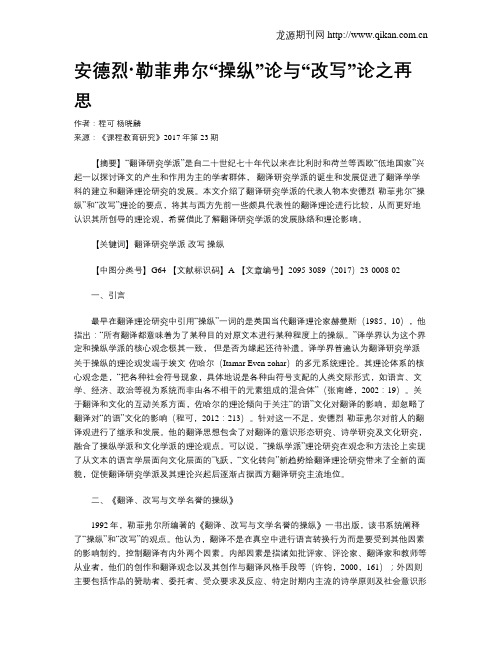
安德烈·勒菲弗尔“操纵”论与“改写”论之再思作者:程可杨晓麟来源:《课程教育研究》2017年第23期【摘要】“翻译研究学派”是自二十世纪七十年代以来在比利时和荷兰等西欧“低地国家”兴起一以探讨译文的产生和作用为主的学者群体,翻译研究学派的诞生和发展促进了翻译学学科的建立和翻译理论研究的发展。
本文介绍了翻译研究学派的代表人物本安德烈·勒菲弗尔“操纵”和“改写”理论的要点,将其与西方先前一些颇具代表性的翻译理论进行比较,从而更好地认识其所创导的理论观,希冀借此了解翻译研究学派的发展脉络和理论影响。
【关键词】翻译研究学派改写操纵【中图分类号】G64 【文献标识码】A 【文章编号】2095-3089(2017)23-0008-02一、引言最早在翻译理论研究中引用“操纵”一词的是英国当代翻译理论家赫曼斯(1985,10),他指出:“所有翻译都意味着为了某种目的对原文本进行某种程度上的操纵。
”译学界认为这个界定和操纵学派的核心观念极其一致,但是否为缘起还待补遗。
译学界普遍认为翻译研究学派关于操纵的理论观发端于埃文·佐哈尔(Itamar Even zohar)的多元系统理论。
其理论体系的核心观念是,“把各种社会符号现象,具体地说是各种由符号支配的人类交际形式,如语言、文学、经济、政治等视为系统而非由各不相干的元素组成的混合体”(张南峰,2002:19)。
关于翻译和文化的互动关系方面,佐哈尔的理论倾向于关注“的语”文化对翻译的影响,却忽略了翻译对“的语”文化的影响(程可,2012:213)。
针对这一不足,安德烈·勒菲弗尔对前人的翻译观进行了继承和发展。
他的翻译思想包含了对翻译的意识形态研究、诗学研究及文化研究,融合了操纵学派和文化学派的理论观点。
可以说,“操纵学派”理论研究在观念和方法论上实现了从文本的语言学层面向文化层面的飞跃,“文化转向”新趋势给翻译理论研究带来了全新的面貌,促使翻译研究学派及其理论兴起后逐渐占据西方翻译研究主流地位。
《翻译、改写以及对文学名声的制控》述评——兼论勒菲弗尔制控论翻译思想研究现状
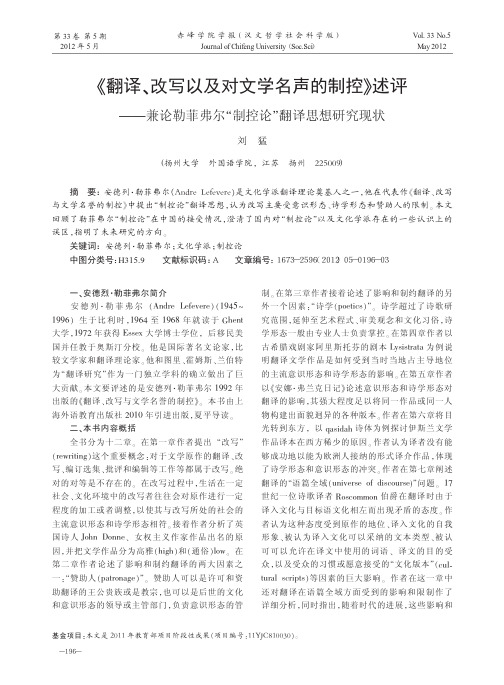
Vol.33No.5M ay 2012第33卷第5期2012年5月赤峰学院学报(汉文哲学社会科学版)Journal of Chifeng University (Soc.Sci )一、安德烈·勒菲弗尔简介安德列·勒菲弗尔(Andre Lefevere )(1945~1996)生于比利时,1964至1968年就读于Ghent大学,1972年获得Essex 大学博士学位,后移民美国并任教于奥斯汀分校。
他是国际著名文论家,比较文学家和翻译理论家。
他和图里、霍姆斯、兰伯特为“翻译研究”作为一门独立学科的确立做出了巨大贡献。
本文要评述的是安德列·勒菲弗尔1992年出版的《翻译、改写与文学名誉的制控》。
本书由上海外语教育出版社2010年引进出版,夏平导读。
二、本书内容概括全书分为十二章。
在第一章作者提出“改写”(rewriting )这个重要概念:对于文学原作的翻译、改写、编订选集、批评和编辑等工作等都属于改写。
绝对的对等是不存在的。
在改写过程中,生活在一定社会、文化环境中的改写者往往会对原作进行一定程度的加工或者调整,以使其与改写所处的社会的主流意识形态和诗学形态相符。
接着作者分析了英国诗人John Donne 、女权主义作家作品出名的原因,并把文学作品分为高雅(high )和(通俗)low 。
在第二章作者论述了影响和制约翻译的两大因素之一:“赞助人(patronage )”。
赞助人可以是许可和资助翻译的王公贵族或是教宗,也可以是后世的文化和意识形态的领导或主管部门,负责意识形态的管制。
在第三章作者接着论述了影响和制约翻译的另外一个因素:“诗学(poetics )”。
诗学超过了诗歌研究范围,延伸至艺术程式、审美观念和文化习俗,诗学形态一般由专业人士负责掌控。
在第四章作者以古希腊戏剧家阿里斯托芬的剧本Lysistrata 为例说明翻译文学作品是如何受到当时当地占主导地位的主流意识形态和诗学形态的影响。
安德烈·勒菲弗尔的改写理论对翻译的解释力的开题报告
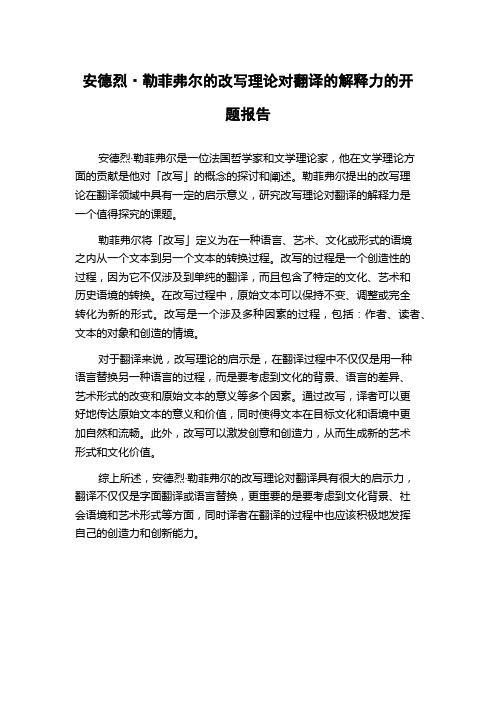
安德烈·勒菲弗尔的改写理论对翻译的解释力的开
题报告
安德烈·勒菲弗尔是一位法国哲学家和文学理论家,他在文学理论方
面的贡献是他对「改写」的概念的探讨和阐述。
勒菲弗尔提出的改写理
论在翻译领域中具有一定的启示意义,研究改写理论对翻译的解释力是
一个值得探究的课题。
勒菲弗尔将「改写」定义为在一种语言、艺术、文化或形式的语境
之内从一个文本到另一个文本的转换过程。
改写的过程是一个创造性的
过程,因为它不仅涉及到单纯的翻译,而且包含了特定的文化、艺术和
历史语境的转换。
在改写过程中,原始文本可以保持不变、调整或完全
转化为新的形式。
改写是一个涉及多种因素的过程,包括:作者、读者、文本的对象和创造的情境。
对于翻译来说,改写理论的启示是,在翻译过程中不仅仅是用一种
语言替换另一种语言的过程,而是要考虑到文化的背景、语言的差异、
艺术形式的改变和原始文本的意义等多个因素。
通过改写,译者可以更
好地传达原始文本的意义和价值,同时使得文本在目标文化和语境中更
加自然和流畅。
此外,改写可以激发创意和创造力,从而生成新的艺术
形式和文化价值。
综上所述,安德烈·勒菲弗尔的改写理论对翻译具有很大的启示力,
翻译不仅仅是字面翻译或语言替换,更重要的是要考虑到文化背景、社
会语境和艺术形式等方面,同时译者在翻译的过程中也应该积极地发挥
自己的创造力和创新能力。
从勒弗菲尔改写理论浅析林语堂英译《莺莺传》
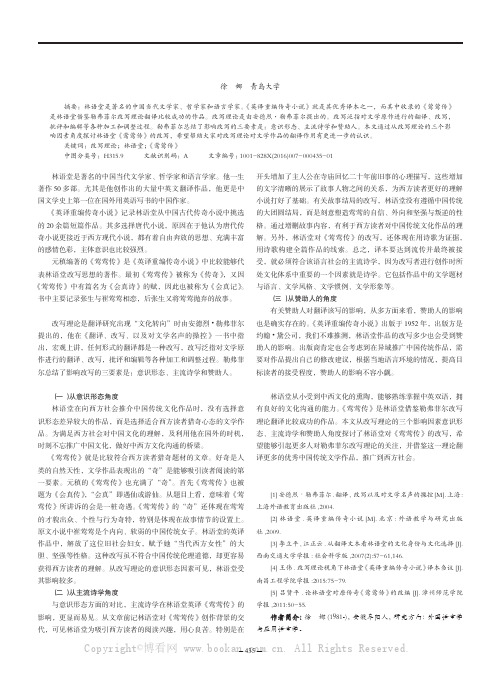
文化视野435从勒弗菲尔改写理论浅析林语堂英译《莺莺传》徐 娜 青岛大学摘要:林语堂是著名的中国当代文学家、哲学家和语言学家。
《英译重编传奇小说》就是其优秀译本之一,而其中收录的《莺莺传》是林语堂借鉴勒弗菲尔改写理论翻译比较成功的作品。
改写理论是由安德烈·勒弗菲尔提出的。
改写泛指对文学原作进行的翻译、改写,批评和编辑等各种加工和调整过程。
勒弗菲尔总结了影响改写的三要素是:意识形态、主流诗学和赞助人。
本文通过从改写理论的三个影响因素角度探讨林语堂《莺莺传》的改写,希望帮助大家对改写理论对文学作品的翻译作用有更进一步的认识。
关键词:改写理论;林语堂;《莺莺传》中图分类号:H315.9 文献识别码:A 文章编号:1001-828X(2016)007-000435-01林语堂是著名的中国当代文学家、哲学家和语言学家。
他一生著作50多部。
尤其是他创作出的大量中英文翻译作品,他更是中国文学史上第一位在国外用英语写书的中国作家。
《英译重编传奇小说》记录林语堂从中国古代传奇小说中挑选的20余篇短篇作品。
其多选择唐代小说,原因在于他认为唐代传奇小说更接近于西方现代小说,都有着自由奔放的思想、充满丰富的感情色彩,主体意识也比较强烈。
元稹编著的《莺莺传》是《英译重编传奇小说》中比较能够代表林语堂改写思想的著作。
最初《莺莺传》被称为《传奇》,又因《莺莺传》中有篇名为《会真诗》的赋,因此也被称为《会真记》。
书中主要记录张生与崔莺莺相恋,后张生又将莺莺抛弃的故事。
一、改写理论简介改写理论是翻译研究出现“文化转向”时由安德烈•勒弗菲尔提出的,他在《翻译、改写、以及对文学名声的操控》一书中指出,宏观上讲,任何形式的翻译都是一种改写,改写泛指对文学原作进行的翻译、改写,批评和编辑等各种加工和调整过程。
勒弗菲尔总结了影响改写的三要素是:意识形态、主流诗学和赞助人。
二、改写理论在林语堂英译《莺莺传》中的应用(一)从意识形态角度林语堂在向西方社会推介中国传统文化作品时,没有选择意识形态差异较大的作品,而是选择适合西方读者猎奇心态的文学作品。
简析勒菲弗尔的重写理论
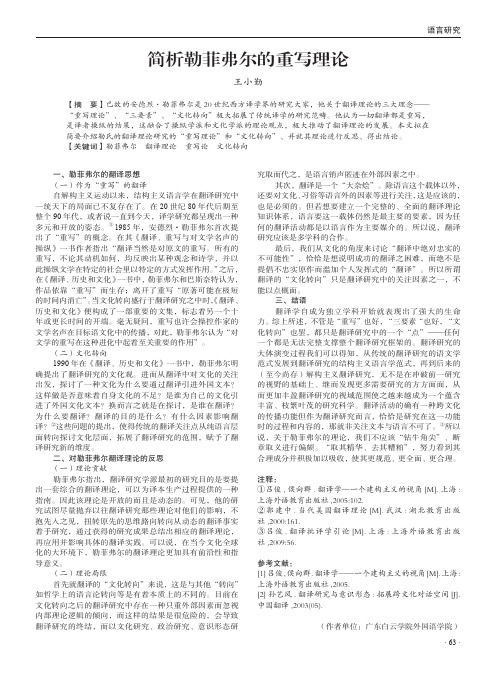
· 63 ·语言研究【摘 要】已故的安德烈·勒菲弗尔是20世纪西方译学界的研究大家,他关于翻译理论的三大理念——“重写理论”、“三要素”、“文化转向”极大拓展了传统译学的研究范畴。
他认为一切翻译都是重写,是译者操纵的结果,这融合了操纵学派和文化学派的理论观点,极大推动了翻译理论的发展。
本文拟在简要介绍勒氏的翻译理论研究的“重写理论”和“文化转向”、并就其理论进行反思、得出结论。
【关键词】勒菲弗尔 翻译理论 重写论 文化转向简析勒菲弗尔的重写理论王小勤一、勒菲弗尔的翻译思想(一)作为“重写”的翻译自解构主义运动以来,结构主义语言学在翻译研究中一统天下的局面已不复存在了。
在20世纪80年代后期至整个90年代,或者说一直到今天,译学研究都呈现出一种多元和开放的姿态。
①1985年,安德烈·勒菲弗尔首次提出了“重写”的概念。
在其《翻译、重写与对文学名声的操纵》一书作者指出“翻译当然是对原文的重写。
所有的重写,不论其动机如何,均反映出某种观念和诗学,并以此操纵文学在特定的社会里以特定的方式发挥作用。
”之后,在《翻译、历史和文化》一书中,勒菲弗尔和巴斯奈特认为,作品依靠“重写”而生存;离开了重写“原著可能在极短的时间内消亡”。
当文化转向盛行于翻译研究之中时,《翻译、历史和文化》便构成了一部重要的文集,标志着另一个十年或更长时间的开端。
毫无疑问,重写也许会操控作家的文学名声在目标语文化中的传播,对此,勒菲弗尔认为“对文学的重写在这种进化中起着至关重要的作用”。
(二)文化转向1990年在《翻译、历史和文化》一书中,勒菲弗尔明确提出了翻译研究的文化观。
进而从翻译中对文化的关注出发,探讨了一种文化为什么要通过翻译引进外国文本?这样做是否意味着自身文化的不足?是谁为自己的文化引进了外国文化文本?换而言之就是在探讨,是谁在翻译?为什么要翻译?翻译的目的是什么?有什么因素影响翻译?②这些问题的提出,使得传统的翻译关注点从纯语言层面转向探讨文化层面,拓展了翻译研究的范围,赋予了翻译研究新的维度。
《翻译、改写以及对文学名声的制控》述评——兼论勒菲弗尔制控论翻译思想研究现状

Vol.33No.5M ay 2012第33卷第5期2012年5月赤峰学院学报(汉文哲学社会科学版)Journal of Chifeng University (Soc.Sci )一、安德烈·勒菲弗尔简介安德列·勒菲弗尔(Andre Lefevere )(1945~1996)生于比利时,1964至1968年就读于Ghent大学,1972年获得Essex 大学博士学位,后移民美国并任教于奥斯汀分校。
他是国际著名文论家,比较文学家和翻译理论家。
他和图里、霍姆斯、兰伯特为“翻译研究”作为一门独立学科的确立做出了巨大贡献。
本文要评述的是安德列·勒菲弗尔1992年出版的《翻译、改写与文学名誉的制控》。
本书由上海外语教育出版社2010年引进出版,夏平导读。
二、本书内容概括全书分为十二章。
在第一章作者提出“改写”(rewriting )这个重要概念:对于文学原作的翻译、改写、编订选集、批评和编辑等工作等都属于改写。
绝对的对等是不存在的。
在改写过程中,生活在一定社会、文化环境中的改写者往往会对原作进行一定程度的加工或者调整,以使其与改写所处的社会的主流意识形态和诗学形态相符。
接着作者分析了英国诗人John Donne 、女权主义作家作品出名的原因,并把文学作品分为高雅(high )和(通俗)low 。
在第二章作者论述了影响和制约翻译的两大因素之一:“赞助人(patronage )”。
赞助人可以是许可和资助翻译的王公贵族或是教宗,也可以是后世的文化和意识形态的领导或主管部门,负责意识形态的管制。
在第三章作者接着论述了影响和制约翻译的另外一个因素:“诗学(poetics )”。
诗学超过了诗歌研究范围,延伸至艺术程式、审美观念和文化习俗,诗学形态一般由专业人士负责掌控。
在第四章作者以古希腊戏剧家阿里斯托芬的剧本Lysistrata 为例说明翻译文学作品是如何受到当时当地占主导地位的主流意识形态和诗学形态的影响。
- 1、下载文档前请自行甄别文档内容的完整性,平台不提供额外的编辑、内容补充、找答案等附加服务。
- 2、"仅部分预览"的文档,不可在线预览部分如存在完整性等问题,可反馈申请退款(可完整预览的文档不适用该条件!)。
- 3、如文档侵犯您的权益,请联系客服反馈,我们会尽快为您处理(人工客服工作时间:9:00-18:30)。
论安德烈·勒菲弗尔改写理论摘要:安德烈勒菲弗尔改写理论强调在社会文化的范畴内进行翻译实践,翻译是一项复杂的活动,绝不是简单的语言间的转换,只有适用特定的意识形态,诗学并在赞助人的影响下,才能被目的语读者接受。
改写理论为林纾的”误译”正名,为其提供了合理存在的理论依据。
关键词:改写理论意识形态诗学赞助人on andre lefevere’s rewriting theories1.theory introduction and illustrationandre lefevere’s main translation theories are refraction and rewriting. he defines refraction as “the adaptation of literature works to a different audience, with the intention of influencing the way in which that audience reads the work”(1992).rewriting is coined for translation studies need to tackle social-cultural, ideological and literary constrains. rewriting fits in with the development of literary translation and readers’ needs. since non-professional readers of literature are now exposed to literature more often by means of rewriting. the author here cites a case in point to illustrate its importance. the poetry of john donne remained relatively unknown for few decades but it wascatapulted to a hit after rediscovery by t.s. eliot and other modernists. rewriting is obviously the answer to this problem.as for the aim of study on rewriting, people now “exits in the most manipulative culture human beings have ever experienced”(scholes 1985), and studying rewriting will not teach people to write well, but it serves as a model that enables them to see through the manipulation of texts in all kinds of media.in the process of rewriting, there are three manipulating factors, namely ideology, poetics andpatron. ideology is the synonym of form, convention, and belief and it is multi-faced and influences not only the selection and understanding of the source text, but also the expression and reception of the target text. living in late qing dynasty, lin shu was inevitably influenced by gender discrimination which was reflected in his works. take dialogues between mrs. shelly and mrs. shelly’s husband from uncle tom’s cabin for example,“mrs. shelly’s husband,‘you are cold and all in a shiver, you allow yourself to feel too much’; mrs. shelly ‘feel too much! am not i a woman-a mother?’”mr. lin rendered the dialogue into “吾悲女流,性情不如丈夫坚壮,动辄生畏”(zhang 2009). however,the dialogue took place that mrs. shelly heard of her husband having sold eliza’s son to a slave owner. as a woman and a mother, she was sympathetic to eliza. nevertheless, driven by gender discrimination that women were fragile and underprivileged, lin did not take the real background into consideration.patron is defined as something like powers that can further or hinder rewriting (lefevere 1992:15). such powers can take on forms of individuals and institution. first of all,the individual patron-interpreter, will be discussed with regards to lin’s translated works. not all lin’s works were of quality and it should partly blame those interpreters who cooperated with lin, since he was a stranger to foreign languages. apart from individual patron, publishing house should not be neglected, either. lin cooperated with the commercial press after his first translated novel la dame aux camelias got a huge success in china. the commercial press adopted two ways to popularize lin’s works, the one in separate editions, the other in magazines. therefore, it is safe to say that lin’s translated novels wouldn’t be so popular without the patronage of the commercial press andinterpreters.poetics is a code of behavior and consists of genre, certain symbols and an ideal of how literature has to, or may be allowed to, function in society. in lefevere’s opinion,poetics does not merely refer to the norms of literature techniques but also the social role of literature. the following examples are illustrated from these two aspects. for one thing, in order to cater to china’s traditional ethics like filial piety, reverence for elder brothers,loyalty and faith, mr. lin eliminated some religious segments. in the preface to uncle tom’s cabin, it says that the source book is written for americans who believe in christian. however, the translator is a nonreligious chinese so he is sorry for the deliberate omission. hence, it is social role of literature in china that results in lin’s deliberate omission. for another, lin’s long-term classical education background resulted in his preference for classical chinese in his rendition. in his mind, the vernacular language was used by those vulgar people. in uncle tom’s cabin, there were lots of negro english expressions which were featured by colloquialism and grammar mistakes, but lin made no hesitation to adapt them to elegant classical chinese, whichwas his norm of literature technique.2reflection on lin shu’s translation from the perspective of rewritingalthough lin’s translated works served as a window for chinese people to understand foreign culture, they have long been controversial for misinterpretation or unfaithfulness. but in the light of rewriting theory, lin’s translation was an outcome of his intentional option to give original works a second life which was manipulated by ideology, poetics and patrons at that time. what’s more, the vitality of translation should be the criteria for translation quality. li’s works enjoyed popularity in the past and even now they are still being studied by scholars. they will undoubtedly influence more people in the future.3 comments on rewriting theorylefevere sets a framework with his rewriting theory in perception of the interaction between translation and other broad factors. translators rewrite the originals to make them fit in with the dominant ideological, poetical current and the need of patrons. rewriting theory, to some extent,legalizes translators’ dynamic role and offers a new perspective for translation interpretation.however, it overemphasizes rewriting and cultural factors,so it completely subverts loyalty in terms of textual equivalence and ignores st’s value. besides, it lacks of practicality since it focuses on macro-depiction but translation practice needs conducting on the level of sentence and text. rewriting theory does not attach due importance to translators’ initiative and exaggerates manipulation; meanwhile it neglects translators’anti-manipulation ability. to sum up, rewriting theory should be studied in a dialectical way.works citedlefevere, andre. translation, rewriting and the manipulation of literary fame. london& new york: routledge,1992.---. “mother courage’s cucumbers: text, system and refraction in a theory of literature” in the translation studies reader. london& new york: routledge, 1992. scholes, robert. textual power. new haven and london: yale university press, 1985.张芸:《从改写理论看林纾的有意误译》,载《湖南第一师范学报》,2009年第九卷第1期,第127-128页。
